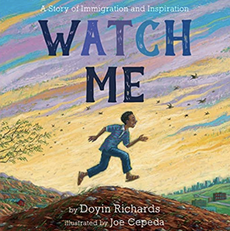 Our students are nearly out the door in June, when we in Core Virtues programs invite them to celebrate our heroes. We put before them rich and often little-known stories of those who lived exemplary lives, taking noble action against great odds for a good cause. It’s very unfortunate that June is a short month in many schools because since 2014, June has also been recognized as national “Immigrant Heritage Month.” And so many of our immigrants have lived exemplary lives and contributed heroically to the national experience. We think about John Muir (Scotland), Joseph Pulitzer (Hungary), Elizabeth Blackwell (England), Andrew Carnegie (Scotland), Samuel Gompers (England), Mary Harris “Mother” Jones (Ireland), Jacob Riis (Denmark), Irving Berlin (Russia), Albert Einstein (Germany), Audrey Hepburn (Belgium), Madeleine Albright (Czechoslovakia), and Henry Kissinger (Germany). And so many others. We know all these names (or many) but perhaps didn’t realize that they were all immigrants. Are their accomplishments in any way related to their choice to leave a hard reality behind and begin again? Young Massachusetts senator John F. Kennedy put this topic on the national radar in 1958 with his volume, A Nation of Immigrants. JFK (and Oscar Handlin before him) reminded us that not only are we (almost) all immigrants or descendants of immigrants, but there is something about the act of emigrating – deciding to leave one country behind and by choice forging a new life in a new land, that fits its participants for at least success in America if not heroism. Why? Immigrants almost invariably have a sense of “agency.” They may have endured horrible circumstances, but they do not see themselves as powerless victims of horrible circumstances. They see themselves as creators of their future, doers. They summon all the resources at their disposal (ranging from courage to cash) to actively seek a better life for themselves and their children. They frequently encounter scorn and derision, discrimination based on language, race, and culture. But they work extraordinarily hard to achieve their dreams. They have higher levels of what Angela Duckworth has described as “grit,” and they are frequently described as “high hope individuals.” “Immigrants – we get the job done,” is the line from Hamilton that prompts a nightly wave of applause on Broadway. We intuit that is true. And the evidence? Consider this: immigrants are entrepreneurs at disproportionately high levels. In 2019 nearly 22% of all U.S. business owners were immigrants, though foreign-born citizens made up just 13.6 percent of the population and 17.1% of the U.S. labor force. In 2016 a full 40% of US Fortune 500 businesses were owned by immigrants or their children. Google Co-founder, Russian-born Sergey Brin, and South African-born Elon Musk (founder of SpaceX, Tesla, Twitter) are ongoing testimony to America's immigrants contributing mightily at the highest levels of the economy, as well as in positions of service and manual labor.  And historically, immigrants have been not just economic contributors, but effective agents for national and social progress. Scottish-born John Muir explored, wrote, and worked tirelessly to create and preserve our national parks. Hungarian-born Joseph Pulitzer strove to advance free speech through his newspapers and supply a home for freedom’s symbol, the Statue of Liberty. British-born Elizabeth Blackwell, our nation’s first female physician, founded the New York Infirmary for Women and Children, and started the first medical college for women. Muir’s fellow Scottish immigrant Andrew Carnegie created not just a steel empire but a network of 1600 plus free libraries. More than one aspiring American poet (such as Langston Hughes) credits his/her early immersion in literature to the Carnegie Libraries. The list of contributions goes on. There were the rabble rousers: Mary Harris “Mother” Jones, of Irish birth, who was not afraid to draw attention to the plight of American labor (sometimes in Carnegie’s own steel mills), and demand change. There was Danish-born Jacob Riis, who used his camera to document How the Other Half Lives, and to spur calls for decent living conditions in our city’s worst tenements. There was Irving Berlin, the little boy from Russia who lived in one of those tenements and was a different kind of rabble rouser: he had a song in his heart early on and lifted our spirits by composing such hits as “Alexander’s Ragtime Band,” “God Bless America,” “Give Me Your Tired,” and “White Christmas.” And we could continue this sort of recounting right up to modern times.
America has a rich and expansive immigrant history, and we build on it with each generation. That doesn’t stop American citizens from going elsewhere sometimes. A former student of mine fell in love with France and spent YEARS working in and trying to become a French citizen. He eventually succeeded and his long legal quest to become part of the Gallic republic is for me a reminder that every nation has the right to control its immigration. I’m a bit passionate on the topic of US immigration because I’m married to an immigrant (from Chile) who is an engineer, entrepreneur, and fruitfully engaged citizen. So, even as we recall that every country has a right to secure its borders and decide paths to citizenship, let’s recall too that those knocking on our doors are more likely friends and assets than foes and enemies. And it’s good to know their stories. Mary Beth Klee
1 Comment
John
6/10/2023 08:57:29 am
This is a wonderful, inspiring article! Spot on. School may be out, or about to be out, but it's full of great thoughts for parents and students who take part in their libraries' summer reading programs.
Reply
Your comment will be posted after it is approved.
Leave a Reply. |
AuthorWrite something about yourself. No need to be fancy, just an overview. Archives
July 2024
Categories |
